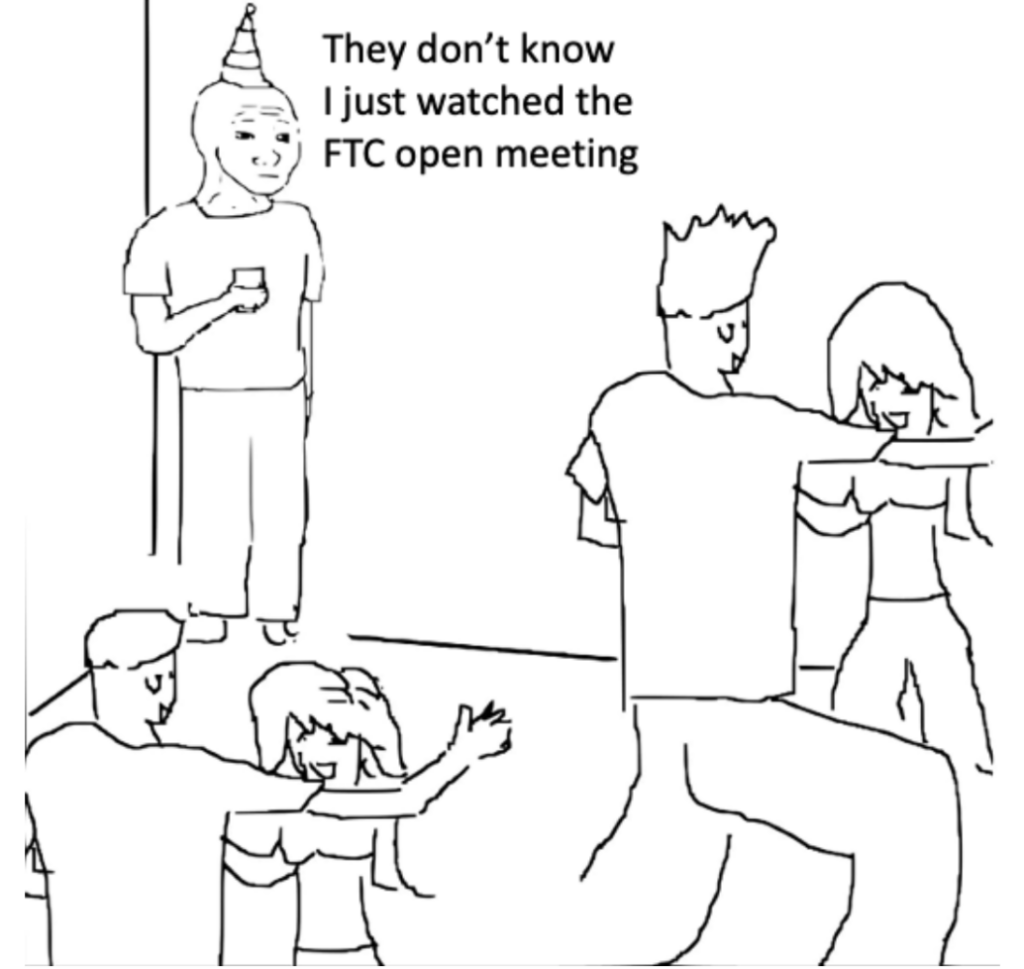
At lunch last week, I handed out the first of my new business cards with the title “Director, Hootenanny Division.” My lunchmate looked down and said, “Sounds fun, what do you do?”
Then, I had to explain that part of the job involves watching open meetings of the Federal Communications Commission (FCC) and reporting on what our federal government has in store for us next. It’s a bit like being a passenger on a steam train. No matter how much fuss you make in the coach cars, the engineer can’t hear you, and wouldn’t care if he could. The engineer’s got places to go, and nothing is going hold him back.
That’s like the FCC and its latest efforts to impose Title II regulation on much of the internet—nothing’s going to hold ‘em back.

Toward that end, and to no one’s surprise, the FCC on Oct. 19 voted 3-2 to move forward with rulemaking to reestablish the commission’s authority over broadband internet access by classifying it as a telecommunications service under Title II of the Communications Act.
A quick refresher on why we say “reestablish”:
- In 2015, the FCC issued the Open Internet Order (OIO) that reclassified broadband internet access as a telecommunications service subject to Title II of the Communications Act. Proponents of the OIO argued that Title II classification was necessary to ensure “net neutrality,” which requires that internet service providers (ISP) treat all internet traffic equally.
- In 2018, the Title II classification was repealed by the FCC’s Restoring Internet Freedom Order.
- In 2021, President Joe Biden issued an executive order that “encouraged” the FCC to “[r]estore Net Neutrality rules undone by the prior administration.”
- Last month, Anna Gomez was confirmed as an FCC commissioner, providing the commission a 3-2 Democratic majority. A day after she was sworn into office, FCC Chair Jessica Rosenworcel announced the agency’s proposal to reimpose Title II regulation on internet services. This time, however, the FCC is leaning heavily on national-security concerns as justification for its common-carrier regulations, rather than net neutrality.

Senior Republican FCC Commissioner Brendan Carr dissented, arguing that classifying broadband under Title II would harm innovation, investment, and 5G deployment. He claimed the past predictions about repealing net neutrality being “the end of the internet as we know it” never materialized, adding that: “You might expect some degree of regulatory humility after the 2017 predictions failed to materialize.” He criticized applying 1930s-era utility regulation to the modern internet. Citing Obama-era solicitors, Carr argued that the U.S. Supreme Court would strike down classifying broadband under Title II.
Commissioner Geoffrey Starks approved moving forward with the rulemaking process, arguing that Title II would protect consumers: “No one should tell these Americans how they can and can’t use the internet and no one should be able to exploit or leverage their connection that they cherish.” Starks said the rulemaking would address gaps in the FCC’s authority over national security and public safety, and defended the FCC’s legal authority to restore the 2015 net-neutrality rules, despite judicial changes.
Commissioner Nathan Simington dissented, claiming the proposed rules are unnecessary, overly broad, and unlikely to survive judicial review. He argued the FCC’s focus on ISPs is misdirected:
I will note, an agency constantly changing its mind without any evidence of a problem is classic arbitrary and pernicious behavior. Additionally, focusing on ISPs, when they are less powerful and monopolistic than Big Tech companies, still raises more questions about arbitrary and capricious action.
Simington echoed Carr that claims that repeal of the earlier Title II regulation would harm the internet were proven false. Rather, he argued, Title II regulation “should worry everyone who hopes for more technology” and specifically, “5G will be crippled.”

In the first full meeting since her confirmation, Commissioner Gomez approved the next step in the rulemaking, saying it would align broadband deployment with open-internet policies:
This proceeding is not about controlling internet content. It is not about stifling investment, regulating rates, or reducing competition. It is not about controlling the internet. Instead the proposed net neutrality rules will ensure access to the internet remains open so that all viewpoints—including those with wihch I disagree—are heard.
Chair Rosenworcel voted to approve, and repeated much of the substance of her Sept. 26 announcement. She said that broadband is now an essential service in need of oversight; argued that reinstating net-neutrality rules and Title II authority would address issues like public safety, national security, cybersecurity and privacy; and maintained that the rules would not harm investment, but would provide regulatory certainty.
Why Title II? Why Now?
Whether the FCC’s imposition of Title II regulation is legally justified remains a looming question that could be subject to a court challenge over the proposed rules. To survive a challenge, the FCC would need to demonstrate that relevant circumstances are materially different than they were in 2018, when Title II was repealed.
Rosenworcel leaned into her common claim that one of the things that’s changed is that broadband is now an essential utility—like water, sewer, and electricity. She claims the COVID-19 pandemic showed how critical internet access is for work, school, and health care. Thus, she argues, FCC regulation and oversight is needed to ensure that access remains open.
Rosenworcel and Starks argued that Title II regulation would allow the FCC to address gaps in its authority over issues like public safety, national security, cybersecurity, and privacy. In contrast, Carr noted that many of the national-security issues that Title II is envisioned to address are already overseen by federal agencies:
We’re now told that Title II is necessary for national security. But the notice identifies no gap in national security that Title II would fill. Indeed, Congress has already empowered executive branch agencies with national-security expertise—including the [U.S. Justice Department], [Department of Homeland Security], Treasury—with the lead when it comes to security issues in the communications sector. It would be incredible, if true, that the FCC has known about a national-security threat for years in our networks and simply stood by the wayside, didn’t seek to eliminate it through existing authorities or even new ones, and just waited to raise it until now. In fact, that’s not credible. The administration has the power it needs to deal with any bad actors, without Title II.
Rosenworcel noted that, since the repeal of Title II in 2018, several states—notably California—have passed their own “net-neutrality” laws. Title II would preempt these state laws and provide regulatory certainty, with a uniform federal framework, as opposed to a patchwork of different state laws.
A Major Question?
Carr and Simington warned that Title II reclassification would likely fail in court under the “major questions” doctrine. Rosenworcel and Starks pushed back against this prediction.
Carr cited the Supreme Court’s decision in West Virginia v. EPA and quoted two Obama-era solicitors as saying it would be “folly” to assume Title II reclassification would survive court challenge.
Starks provided the most thorough defense of the FCC’s authority, saying three Supreme Court justices have explicitly said broadband can be classified as a common-carrier service. He added that the major questions doctrine still permits agency deference in interpreting ambiguous statutes:
Over the more than 20 years of courts reviewing this exact question, every single judge to take a position on the correct classification of broadband has concluded that it very obviously is a common-carrier service. Three Supreme Court justices explicitly stated that the answer was quote ‘perfectly clear.’ How many judges have ever said that broadband plainly is not a common-carrier service? That answer’s perfectly clear, too. The answer is zero. Not a single one.
There’s more. Over the 20 years, the Supreme Court also said that Congress very obviously gave us the authority to decide the question of what counts as a telecommunications service. It did so even after it decided a trilogy of cases viewed as the genesis of what we now call the major questions doctrine.
Evidently, calling a telecommunications service ‘telecommunications service,’ as we’ve done for years, is not packing a mountain into a statutory molehill. Even if it were somehow, shoehorning broadband into a definition of an ‘information service’ surely would be much more of one.
This ride on the Title II Express is not very exciting. We know where we’re going, and we have a good idea of when we’ll get there. The real fun happens when we reach our destination and the court cases get rolling.




